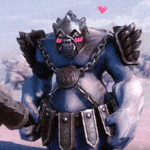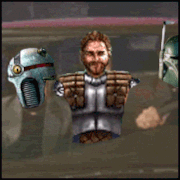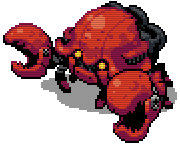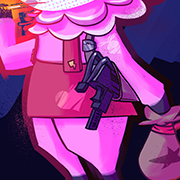|
FourLeaf posted:It's a long video but I'm wondering what the experts in the thread think about it. It was also interesting to think about dialogue in games that are widely considered to have good writing, like Witcher 3, and compare it with his "Accept-Reject-Deflect" trinary. Oh hey, something I'm somewhat qualified to talk about; I wrote the Banner Saga and have worked at BioWare. I also know Jon Ingold! On the first Banner Saga we used Inklewriter (his branching dialogue program) and even had them develop some features for us. I coincidentally watched the video already. From the point of view of his talk, I think it's very well presented with some great ideas about structure and remembering to convey the intent of the story. I agree with his assessment that most game writing is "bad", but I don't think it's the developer's fault. It's not because the games industry is filled with amateurs compared to other industries. Game writing is a casualty of game development, to the point where most developers "give up" on good writing because it's extraordinarily hard, resource-intensive and only a small percentage of your audience even cares about it in the first place (for most games). In fact, it's a liability- if you don't try to make a good story, your audience shrugs and doesn't care and still has a good time. But god help you if you try to write a good story, because suddenly everyone becomes a literature professor. As some comments have already mentioned, the fact that tv or movies is a linear experience lets you precision-tune the pacing to your exact needs, and pacing is king. If the story beats are "off" by even a minute or two everything falls apart and feels wrong. Some directors can make exceptions that work, with extraordinary effort. Now take even the most simple gaming experience- maybe you're engaged in dialogue, then expected to walk to the next bit of dialogue. The player can ruin this in a million ways. They can get distracted by the environment, or side content, or just have to reload a couple times or engage in actual gameplay. Imagine a movie where the protagonist grinds mobs for literally 20 minutes between conversations, or a movie where you watch him drive his entire commute to work for 15 solid minutes while nothing happens. This is 90% of what makes up most games. There are other issues he doesn't have time to mention, beyond the actual quality of the writing. A movie is a passive experience- the viewer doesn't have to understand what is going on for it to end the right way. A lot of movies will even intentionally confuse the viewer. A game player needs constant motivation, they need direction, they need to always know what they're doing or so-help-me-god they will feel lost and blame the game. Presenting all this information to a player through dialogue is extremely unnatural. Take the Assassin's Creed example: the speaker has awkward, ham-fisted lines telling Kassandra where to go- twice- and at the end of the conversation the player is still probably thinking "wtf am I suppose to do?". We give them literal GPS so they don't get lost. In a movie, all the viewer has to do is try and keep up with the narrative, not direct the movie themselves. Additionally, what a character says in a game, and what they do, are completely at odds. To fill hundreds of hours of gameplay, the player performs an impossible series of tasks, from killing hundreds of people, or being essentially invincible to not needing food, shelter, sleep, entertainment or companionship. In an RPG we steal everything we can find and then have to pretend to care about an NPC being hanged for thievery. The player will naturally make decisions that are good for gameplay, even if they make no sense in the context of a story. Then, in conversation, the player has to pretend that their character is a real, relatable human being. How, exactly, do we expect good writing to erase this? These things sit poorly in the back of our minds, and we start to think the writing must be bad. Movies or books often give the viewer a wide breadth of things to think about : feelings, relationships, different aspects of life. Games usually funnel down into retreads of the same tiny number of plot points which accommodate gameplay. How many games stories are about either survival or duty (such as saving the world)? How many times can you be impressed by a story trying to tell you the same exact thing? Movies can offer an almost infinite spectrum of topics that make up good stories, games offer: survival or duty. Agency is its own entire can of worms I could write a whole book about. Being able to come up with a plan or goal on our own and then act on it is what makes us real people. In a movie, the protagonist has complete agency, to the point that the viewer themself often doesn't know what he intends to do. Their motivation does not have to match the viewer's motivations. In a game, if you tell someone to take on a role they'll inject themselves. Take something like Fallout 4, where the conceit is that your child was stolen from you, and you have to find out what happened to them. In a movie- perfectly reasonable premise. As a game, a prime example of bad writing; most players didn't come to Fallout to roleplay looking for a baby. And as this relates to agency- even in a sandbox game, we're constantly told what to do. We cannot come up with our own solution to find our son, we can only perform the series of tasks handed to us. Every moment that doesn't feel like our own decisions are playing out in believable ways comes across as bad writing. A narrative can only be hand-held so many times before it begins to feel subconsciously artificial. So on that topic, there's also the fact that gamers are coming at a game experience from so many different directions. In a movie, you have one option: just let it all wash over you. At the end, decide whether you enjoyed it or not. In a game, some players want to control the situation. Some will want to "play along" with the story. Some are just trying to figure out which choices will make the characters gently caress, some are spamming the "next" button to get back to the action. Good luck accommodating all these things- and believe me, the number of kind, lovely players who come into a game willing to experience the creator's vision is the minority at best. Most are trying to "win" the conversation, or bend the game to their will. Ingold's idea of giving players an accept/reject/deflect option isn't bad, and a lot of story-driven games do this (like old BioWare). But it also leads to a character who can feel bi-polar, because their responses from one conversation to the next can swing wildly, and this again leans into a subconscious feeling that the writers are at fault for bad writing. The alternative- giving the character a consistent personality or attitude- takes away player choice and will frustrate players who don't want to role-play that personality. See: LA Noire, in which I thought Cole was a wonderfully consistent protagonist, but which many players considered "terrible writing". Lastly, anyone who has made a game can tell you how hard it is to communicate even the most simple ideas in an interactive environment, much less complex ones. If a player is confused by something, it's bad writing. If your writing is so simple that everyone understands it, it's bad writing. In conclusion, when gamers say that games have "bad writing" what they're really saying (most of the time- this is a generalization) is that the game didn't meet their expectations. They wanted to do or say something they couldn't, they expected the game to respond in unreasonable and infinite ways, their character behaved in a way that they wouldn't, or they expected movie-level subtext and pacing from a medium that simply can't deliver it. All the things that we easily accept from a linear experience like movies, tv or books are brought into question in an interactive one. It's my opinion after doing this for nearly 20 years and having more experience with branching, interactive writing than most people on the planet, that game writing will never be as "good" as bespoke movies, tv or books. There is no secret-sauce combination of words that will somehow be more effective at delivering a written story than a non-interactive experience. However, games deliver an unique experience. If you can overlook the inherent flaws, and stop yourself from overthinking things, you get to be a part of the story. That non-passive experience can be a truly powerful and personal one, and occasionally a better one than anything a passive experience can provide. Thanks for taking the time to read my take on it, and hopefully I didn't come across as too arrogant! Chewbot fucked around with this message at 02:19 on Dec 4, 2018 |
|
|
|

|
| # ? Apr 16, 2024 05:16 |
|
thanks for that answer, Chewbot! Banner Saga owns but i have to play it in short spurts or else i just want to cry from how desperate and miserable that world is and how much i just want the characters to live their lives so then what's the secret sauce at, say, obsidian or cd projekt red that allows their storytelling to flourish and breathe and be beloved by all? what is the difference between writers at bethesda game studios and the writers at inXile? or am i asking the wrong question? honestly, i just want games with the 'writing' (storytelling? narrative? setting? what is a better word then 'writing'?) of New Vegas, Witcher 3, Deus Ex, Wolfenstein TNO/TOB/TNC or even Doom 2016. is the 'quality' level too ephemeral? is this something that can be fixed/needs fixing?
|
|
|
|
Chewbot posted:Thanks for taking the time to read my take on it, and hopefully I didn't come across as too arrogant! Not at all; that was very insightful and interesting to read. The way you lay it all out makes so much sense that I wonder why it wasn't blindingly obvious to me in the first place.
|
|
|
|
(And Animal Crossing)
|
|
|
|
Great answer, Chewbot. Hypothetically, what about giving players a sort of accept/reject/deflect option at the very start of the narrative, determining the scope of narrative role and engagement? Give an option for the role-players, an option for the passive narrative accepters, an option for the conversation "winners" (perhaps, it'd be resource-intensive in this setup), and (gulp) an option for the next button hammerers? Is shifting major plot elements mid-development also a nigh-universal writing problem? I see the telltale signs of these issues often in "AAA" productions. What strategies do games writers use to adapt to it/prepare for sudden 90 degree turns in, say, event order? Discendo Vox fucked around with this message at 01:03 on Dec 4, 2018 |
|
|
|
i always liked the way tactics ogre handled player interactivity in the narrative. there's a bunch of small dialogue options that can be "gamed" for optimal outcomes, but there's a couple Big Story Decisions that create 3ish branching paths through the story, all of which are roughly equal mechanically. so the player is more choosing what kind of story they want to see/what kind of person they want their main character to be, and i wish i knew of more games that took that kind of approach
|
|
|
Chewbot posted:
Thanks for the good write up In my small sample size of people I've talked to there seems to be one "trick" for games writing, if you can make the player feel smart for figuring out something not obvious in the story they seem to think the writing is better even if it isn't.
|
|
|
|
|
Chewbot posted:Thanks for taking the time to read my take on it, and hopefully I didn't come across as too arrogant! Thanks for taking the time to write this! Your take is really interesting. Some of the difficulties you mention are exactly what I imagined they would be, but some of them are things I hadn't considered at all. Chewbot posted:Oh hey, something I'm somewhat qualified to talk about; I wrote the Banner Saga and have worked at BioWare . . . <snip> If you're free/inclined, I'd be really interested to know if these were considerations that were taken into account in designing the gameplay of the Banner Saga. One of the things that really made it work for me as a narrative is that the mechanics of the game enforce pacing; aligning the motivations and situation of the protagonist (the caravan has to keep moving and all I can do is try to protect the people in it) with the precise motivations of the player really made the narrative resonant. I have no idea if it was actually the case, but it feels like a game that had a story before it had mechanics rather than the other way around.
|
|
|
|
Chewbot posted:Oh hey, something I'm somewhat qualified to talk about; I wrote the Banner Saga and have worked at BioWare. I also know Jon Ingold! On the first Banner Saga we used Inklewriter (his branching dialogue program) Thanks very much for your interesting post! I'd also love to hear what dialogue writing program you use now / like best / wish existed.
|
|
|
|
ETPC posted:thanks for that answer, Chewbot! Banner Saga owns but i have to play it in short spurts or else i just want to cry from how desperate and miserable that world is and how much i just want the characters to live their lives No problem! I suppose of the games you mentioned (aside from maybe Doom) I suspect all these were designed story-first, which is pretty rare for most games. The usual procedure is to design the core mechanics or set pieces, then come up with a story to tie them together and that creates all kinds of compromise that the player can intrinsically feel. I think the reason prioritizing story is rare is because it isn't the best way to sell a game. You may or may not be surprised how little story matters to a large segment of gamers. But honestly, I'm not sure everyone would agree that all the examples you listed are considered "good writing" compared to the best of the best in other industries. It is very frustrating to me when something really skillfully done is dismissed as "bad writing" by some internet kid with a youtube channel (and I'm not talking about my game). wizzardstaff posted:Not at all; that was very insightful and interesting to read. The way you lay it all out makes so much sense that I wonder why it wasn't blindingly obvious to me in the first place. Thank you! It's only obvious to me because I think about it 7 days a week! Studio posted:
Hah, I was wondering if anyone still remembered that stuff! Can you believe it's been over 10 years since then? Geez. Discendo Vox posted:Great answer, Chewbot. Hypothetically, what about giving players a sort of accept/reject/deflect option at the very start of the narrative, determining the scope of narrative role and engagement? Give an option for the role-players, an option for the passive narrative accepters, an option for the conversation "winners" (perhaps, it'd be resource-intensive in this setup), and (gulp) an option for the next button hammerers? Yeah, funny you mention that, it's something we tried when prototyping Banner Saga and we found that it just confused players when you tell them their choice is going to set the tone for a convo. Maybe we could have done it better, but for the most part they didnt understand what choice they were even making, the same way that "Doubt" from LA Noire was so confusing. Plus the tone of a convo can and should change over its, and then players felt like maybe the made the wrong decision because they didnt have all the info when they had to make it. I do think games are doing about the best they can do, considering all the pitfalls that come with game dev. The "trapdoors" that Jon talks about in his presentation does a lot of the work of letting people skip stuff in a natural way. The real issue is that plugging a framework onto a conversation never feels natural. When you're talking in real life, you don't think about accept/reject/deflect after every sentence, you're usually just trying to keep the conversation flowing and not look like a weirdo. Moving targets and rework can be a very big problem in game dev and you end up resigned to some sub-par content because you just don't have time to do everything perfectly, which can be demoralizing for sure. I think most gamers believe that game devs and especially AAA game studios are like these professional, well-oiled machines. In reality, it's just an endless poo poo-storm of things breaking and people loving up and everyone trying to deal with the latest fire as well as they can. That's true of anyone working in a creative field. That is to say, they don't have the time or capacity to prepare for major changes suddenly appearing other than to do their best and work a lot. Movies and TV obviously have similar issues and you can usually tell when things were a mess in production. ninjewtsu posted:i always liked the way tactics ogre handled player interactivity in the narrative. there's a bunch of small dialogue options that can be "gamed" for optimal outcomes, but there's a couple Big Story Decisions that create 3ish branching paths through the story, all of which are roughly equal mechanically. so the player is more choosing what kind of story they want to see/what kind of person they want their main character to be, and i wish i knew of more games that took that kind of approach Yeah, setting the player's expectations early can help, i.e. telling the player HERE IS A BIG DECISION WHERE THE STORY SPLITS. It does still feel a little gamey and rely a lot on context. It works better in the context of playing something that really feels like you're playing a game than it does in the context of a modern, cinematic experience like AssCreed: Odyssey. It's kinda fallen out of fashion because nobody wants to create truly divergent content as content becomes more and more expensive to create. Flannelette posted:Thanks for the good write up Heh, probably true at least to a certain extent. Banner Saga unfortunately went the opposite direction where (in the interest of trying to make things believable) a lot of players felt like they could never make the right decision, and that made them feel dumb. But would the writing in the games you're referring to really hold up when compared to other industries, or is it just to make the player feel good about themselves? Movies, etc can tell stories without having to make the viewer feel good and smart. Wallet posted:Thanks for taking the time to write this! Your take is really interesting. Some of the difficulties you mention are exactly what I imagined they would be, but some of them are things I hadn't considered at all. The enforced pacing of TBS is probably the #1 reason any of what we've attempted works at all. If you weren't basically "on rails", the pacing wouldn't carry nearly the same weight that we were able to squeeze out of it. To make that happen, you've figured exactly right that we designed all the gameplay around the story, which is definitely NOT what most developers do. You have to be so confident that your story is going to carry the game that you're willing to potentially sacrifice the gameplay. We weren't as confident about our story as we were incredibly naive about how hard it would be, and also a fair bit of luck that it all kinda came together.  Oh dear me posted:Thanks very much for your interesting post! I'd also love to hear what dialogue writing program you use now / like best / wish existed. Thank you! We'd still be using Inklewriter, which is excellent, except that we eventually needed it to do things specific to our game, so we had to build our own. I wouldn't recommend our tool unless you're making a Banner Saga game. I'd definitely recommend Inklewriter! Chewbot fucked around with this message at 23:31 on Dec 4, 2018 |
|
|
|
Chewbot posted:Hah, I was wondering if anyone still remembered that stuff! Can you believe it's been over 10 years since then? Geez.  This thread has been officially cursed
|
|
|
|
Chewbot posted:No problem! I suppose of the games you mentioned (aside from maybe Doom) I suspect all these were designed story-first, which is pretty rare for most games. The usual procedure is to design the core mechanics or set pieces, then come up with a story to tie them together and that creates all kinds of compromise that the player can intrinsically feel. I think the reason prioritizing story is rare is because it isn't the best way to sell a game. You may or may not be surprised how little story matters to a large segment of gamers. But honestly, I'm not sure everyone would agree that all the examples you listed are considered "good writing" compared to the best of the best in other industries. It is very frustrating to me when something really skillfully done is dismissed as "bad writing" by some internet kid with a youtube channel (and I'm not talking about my game). That's what I figured. Though apparently the story was done a year before Doom shipped (there is an interview with the lead writer out there that talks about how they just finished writing Doom in 2015), which is shocking. I kinda always knew that 'deep and reactive storylines' were nowhere near as sexy a bullet point as 'MORE GRAPHICS' but, god, everytime I hear it it never gets less depressing. This coupled with an industry that (from my pov obv i'm just a consumer idk what goes on if i can't see it) seems to want to move as far away from linear, single player, narrative-driven experiences as possible because you can't monetize storytelling sometimes feel like I'm good just playing old games forever.
|
|
|
|
Chewbot posted:The enforced pacing of TBS is probably the #1 reason any of what we've attempted works at all. If you weren't basically "on rails", the pacing wouldn't carry nearly the same weight that we were able to squeeze out of it. To make that happen, you've figured exactly right that we designed all the gameplay around the story, which is definitely NOT what most developers do. You have to be so confident that your story is going to carry the game that you're willing to potentially sacrifice the gameplay. We weren't as confident about our story as we were incredibly naive about how hard it would be, and also a fair bit of luck that it all kinda came together. This was want I wanted to ask about, from a consumer of games who has a "games as a narrative" perspective when he goes hunting for story based games. I've often thought that the writing problem could be partially solved by writing the story first, then figuring out what gameplay elements you need to make the story come alive after, and develop the actual game based on that road map. The obvious hurdle is accounting for what is technically possible, but I feel like if you are trying to sell a game on story, lacking innovation on the gameplay front is probably more acceptable (at least to me) than having a horrible ludonarrative disconnect pressing F to pay respects. The second thing that came to mind was Alpha Protocol, as this is one of my all time favorite story games for how natural the conversations seem. I never felt constrained by the story when playing, and always felt that I did in fact have agency even though the narrative was always going to end up in the same places. Real or imagined, I felt like my choices when handling conversations and characters led to different outcomes, even if every story leads to storming the Grey Box. If pressed, I'd say it is because the short length of the game lends itself better to actually portraying branching outcomes that long form AAA epics don't have the luxury of when trying to cram tens of hours of gameplay into the package. What are your thoughts on sacrificing length of gameplay for breadth of storytelling?
|
|
|
|
The animal crossing lp was unforgettable writing with amazing fanart.
|
|
|
|
ETPC posted:That's what I figured. Though apparently the story was done a year before Doom shipped (there is an interview with the lead writer out there that talks about how they just finished writing Doom in 2015), which is shocking. I kinda always knew that 'deep and reactive storylines' were nowhere near as sexy a bullet point as 'MORE GRAPHICS' but, god, everytime I hear it it never gets less depressing. This coupled with an industry that (from my pov obv i'm just a consumer idk what goes on if i can't see it) seems to want to move as far away from linear, single player, narrative-driven experiences as possible because you can't monetize storytelling sometimes feel like I'm good just playing old games forever.
|
|
|
|
Warmachine posted:This was want I wanted to ask about, from a consumer of games who has a "games as a narrative" perspective when he goes hunting for story based games. I've often thought that the writing problem could be partially solved by writing the story first, then figuring out what gameplay elements you need to make the story come alive after, and develop the actual game based on that road map. this is basically why i think undertale and deltarune are both particularly brilliant. It's clear that the narrative inspired the game mechanics and there are constantly places where the line between game mechanic and narrative are blurred to the point where it's basically nonexistent. For what it's worth, I think a lot of these problems come down to: - many game writers aren't very good writers and kinda just want to ape genre fiction - many writers who are good are not good gameplay designers and don't understand how to mesh gameplay with their narrative - many gameplay designers don't care about or understand narrative - many gameplay designers aren't very creative about how to mold their gameplay mechanics around the narrative to reinforce it and make it richer. To make a great game with a great narrative that feels really well integrated, you need a ton of creativity not just from the writers but also from the gameplay designers. the writers need to understand how to stretch their writing skills to work within the context of a game and the gameplay designers need to understand how to make their gameplay resonant with the narrative. Instead, in my experience, usually narrative and gameplay design are basically in their own forts throwing poo poo over the walls at each other. I don't think it's a coincidence that the games that imo integrate gameplay and narrative really well either are made by a single person, a very small team, or have a director with a very strong hand forcing the gameplay and writing to resonate with each other (e.g. the from software games) EDIT: just to go into more detail, even with good people, the hardest part of making a game is that a game of any substantial size is impossible for one person to develop, and communicating a vision in a way that gets people to internalize and produce content aligned with it is insanely hard. And if your gameplay designers and level designers and narrative designers and artists and gameplay programmers and etc. etc. aren't all on the same page wrt the importance of both gameplay and narrative and how you are going to integrate them, it's incredibly easy for cracks to start showing up all over the game just because whoever touched that part of the game didn't get it. The only way to paste over those cracks is with oversight and iteration, which takes time & money, and which is a luxury a lot of games just don't have. djkillingspree fucked around with this message at 22:32 on Dec 5, 2018 |
|
|
|
Warmachine posted:This was want I wanted to ask about, from a consumer of games who has a "games as a narrative" perspective when he goes hunting for story based games. I've often thought that the writing problem could be partially solved by writing the story first, then figuring out what gameplay elements you need to make the story come alive after, and develop the actual game based on that road map. The obvious hurdle is accounting for what is technically possible, but I feel like if you are trying to sell a game on story, lacking innovation on the gameplay front is probably more acceptable (at least to me) than having a horrible ludonarrative disconnect pressing F to pay respects. as an ex-obsidian employee who didn't work on AP, I don't think the scope of AP was dictated by the branching story as much as the scope was dictated by production realities and the branching story was the result of being creative with those scope limitations. I think the only things that prevent someone from making "AP but better in 2018" are how few people played AP to learn from it and how intimidating designing branching reactivity feels as a designer, even though it's actually honestly not that bad :P
|
|
|
|
djkillingspree posted:To make a great game with a great narrative that feels really well integrated, you need a ton of creativity not just from the writers but also from the gameplay designers. the writers need to understand how to stretch their writing skills to work within the context of a game and the gameplay designers need to understand how to make their gameplay resonant with the narrative. Instead, in my experience, usually narrative and gameplay design are basically in their own forts throwing poo poo over the walls at each other. I don't think it's a coincidence that the games that imo integrate gameplay and narrative really well either are made by a single person, a very small team, or have a director with a very strong hand forcing the gameplay and writing to resonate with each other (e.g. the from software games) Kojima and the MGS series are another prominent example. Treating writing and game design as inseparable has led to some obvious successes -- why do you think those teams/functions aren't typically integrated?
|
|
|
|
acksplode posted:Kojima and the MGS series are another prominent example. Treating writing and game design as inseparable has led to some obvious successes -- why do you think those teams/functions aren't typically integrated? Practically speaking, the skill sets for a narrative designer, combat designer and level designer are all very different and specialized, and continue to get even MORE specialized as games get more complex. There aren't a ton of people who can really understand all 3, and even if they could, they don't have the time to do all 3 jobs at once. And, I think, on a big team game it's often extremely hard to get people to look past what they are making today and how they as a creator think about it vs. what the player experience of it is going to be. It sounds easy, but when you're working 40 (or 50, or 60) hours a week on something, it's actually really hard to step back and say "does this accomplish what we want narratively?" and "how will the player react to this" especially when you are constantly having to make choices for technical or other reasons that aren't player motivated
|
|
|
|
i hope you guys unionize so you can work normal people hours 
|
|
|
|
I saw this article where game industry people talk about their favorite game of 2018, so I figured I'd ask goon devs for their opinions. There was some discussion upthread about how making games makes you see games differently, and I think it would be interesting to hear.
|
|
|
|
Arbitrary Number posted:I saw this article where game industry people talk about their favorite game of 2018, so I figured I'd ask goon devs for their opinions. There was some discussion upthread about how making games makes you see games differently, and I think it would be interesting to hear. Exapunks. It isnít even close. And as much as I love Zachís games, I really donít want a lot of clones showing up. The niche is fairly small, and Iím not sure the market would support more than a handful of them a year.
|
|
|
|
Arbitrary Number posted:I saw this article where game industry people talk about their favorite game of 2018, so I figured I'd ask goon devs for their opinions. There was some discussion upthread about how making games makes you see games differently, and I think it would be interesting to hear. Breath of the Wild was the best game of 2018 even though it came out in 2017.
|
|
|
|
It's hard to pick a single game since I like different games for different reasons. God of War was great not only for its action but for the storytelling and theme and I think if I had to choose, this is the one I'd go for as the most solid overall pick). Return of the Obra Dinn was the first detectivin' game I've played in a long time that actually felt like I was figuring something out and not going through rote motions to satisfy the game enough for it to show me another cutscene. La-Mulana 2 was something I'd been anticipating for a very long time and delivered exactly what I wanted out of that sequel.
|
|
|
|
ShadowHawk posted:People already cheat at online chess, adding a random element doesn't make it that different unless the randomness determines the game almost entirely. And then you've just re-invented online poker. Hello from early February.. Out of curiosity, how do hackers cheat at chess? And wouldnít it be really obvious?
|
|
|
|
There's no hacking involved. Just start up an invincible chess computer, copy your opponent's moves into it and play back the moves it does in your online game.
|
|
|
|
the real answer is that cheating became a massive problem once dedicated servers and server communities went away. It was much easier to ban a player and get them to go away when you had a server with a small population than it is in a massive game where there's no sense of persistent identity within a community. Obviously people cheated back then but it was much simpler to just ban them from your server and move on when you didn't need to ask a massive company's support reps to pretty please ban them
|
|
|
|
reason #594835673897563978426534987659786349758667834 why i miss server browsers and community servers and admins
|
|
|
|
They're dead and gone, I'm afraid.
|
|
|
|
Some games at least still have that classic community server/admin structure, but they're few and far between (and all the ones I can think of off the top of my head are survival games)
|
|
|
|
it's such a bummer. god i miss the 90's/2000's style of multiplayer before halo 2 changed loving everything and everyone had to clone their lovely system. "no mods, no community servers" basically meant i rarely got into any post cod4/WaW game's multiplayer (with a few exceptions like blops 1 and siege) recently. at least DICE games still have server browsers ETPC fucked around with this message at 19:22 on Dec 12, 2018 |
|
|
|
ETPC posted:it's such a bummer. god i miss the 90's/2000's style of multiplayer before halo 2 changed loving everything and everyone had to clone their lovely system. yeah i have been thinking about this a lot lately. I feel like a lot of the problems of the modern internet are caused by disintegrating small communities resulting in people being tossed into giant anonymous spaces, usually so that the communities can be monetized more efficiently. even outside of gaming - like, what makes something awful consistently more pleasant than reddit or w/e.
|
|
|
|
i understand *why* matchmaking had to become the default ("joe dipshit mashes his entire rear end on the controller the moment the game boots up and if that dosen't immediately get him into a match then he will yell at us") but christ at the very least give us matchmaking *and* server browsing/community servers. and let us have server files, holy poo poo. or release server files for your old games!
|
|
|
|
ETPC posted:i understand *why* matchmaking had to become the default ("joe dipshit mashes his entire rear end on the controller the moment the game boots up and if that dosen't immediately get him into a match then he will yell at us") but christ at the very least give us matchmaking *and* server browsing/community servers. and let us have server files, holy poo poo. or release server files for your old games! Server browsers expose that you have less than 100 people playing.
|
|
|
|
mutata posted:They're dead and gone, I'm afraid. Fwiw I'm working on a thing with dedicated servers and browser support, and there are still some games that allow it. It's just not happening in the AAA scene, that's all. I hope you guys aren't the kind of people who only care about AAA games and the rare indie thing that gets lucky with its marketing a la undertale and celeste.
|
|
|
|
https://www.gameinformer.com/2018/12/21/game-workers-unite-the-fight-to-unionize-the-video-game-industry big writeup about GWU and the global push for unionizing game dev in fuckin Game Informer! this seems pretty rad!
|
|
|
|
With modern remasters of classic games (e.g. the recent Spyro and Crash Bandicoot series remasters, the 2011 Halo 1 remaster, the upcoming Warcraft III remaster) how does the cost, the development time, and the development process compare to developing a game from scratch? For clarity, I'm asking about the remasters where the graphics and the engine are overhauled or remade but the game design, level structure etc etc remain the same, rather than a total remake/reimagining that changes a lot of features.
|
|
|
|
If this isn't too politically charged, how do you guys feel about reddit mobs getting game employees fired like in the Arenanet thing? Is this something you're worried about or were the company(ies) who gave into the mobs just unusual pushovers? Does this affect your opinions on unionizing?
|
|
|
|
Xun posted:If this isn't too politically charged, how do you guys feel about reddit mobs getting game employees fired like in the Arenanet thing? Is this something you're worried about or were the company(ies) who gave into the mobs just unusual pushovers? Does this affect your opinions on unionizing? I think the companies who did this (mostly Riot and Arenanet afaik) established a gross and bad precedent and also are hurting themselves in the long run because they showed that they care more about the internet mob than devs, when devs are the ones who actually, you know, make their games good, and the internet mob will give you goodwill for firing someone for about 5 seconds and then go back to being mad about whatever. Overall, I'm also very suspicious of companies that place a huge priority on how important "the community" is, because of who most of those companies define "community" as "people who post". And I don't necissarily think catering primarily to the people who tweet/post on forums/reddit results in the best games or the best environment to be in when making them. It does however create insane fanbases of angry content creators who seem ready to turn on you at a moments notice! In general I am pretty skeptical of the amount of post-release developer and community interaction. I feel like online games, especially PvP games, are patched too frequently to placate ppl online and it results in metas being overly stale and dominated by groupthink. I personally felt that the fighting and strategy games that existed prior to frequent patching were healthier as games overall because the lack of patches forced players to be creative to overcome perceived imbalances. I think the whole situation just amplified my feelings on unionization but I was pro union anyways.
|
|
|
|

|
| # ? Apr 16, 2024 05:16 |
|
djkillingspree posted:I think the companies who did this (mostly Riot and Arenanet afaik) established a gross and bad precedent and also are hurting themselves in the long run because they showed that they care more about the internet mob than devs, when devs are the ones who actually, you know, make their games good, and the internet mob will give you goodwill for firing someone for about 5 seconds and then go back to being mad about whatever. It goes for all walks of life, never listen to your fans.
|
|
|













































